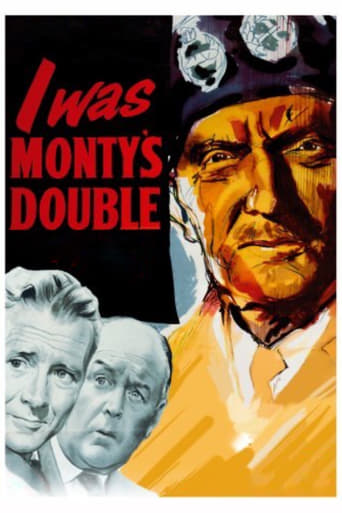Prismark10
Apparently using doubles as decoys to fool the enemy is nothing new. It takes place even now and during World War 2 there were several Winston Churchill lookalikes in good employment.I first saw this film as a kid and thought it was fantastically entertaining. The film takes place a few months before the D-Day landings are due to take place. The British government wants to have a campaign of mis-information and have rumours that the landings might take place at a location other than NormandyClifton James was an actor who had an uncanny resemblance to General Montgomery and is enticed by John Mills to impersonate the man himself in order to dupe the Germans.The film is a straightforward adaptation of James real life story although more tension and humour has been added as well as a kidnapping storyline at the latter part of the movie which did not actually occur. Also in real life James was fond of a drink and smoke unlike Monty.It is a shame that Clifton James did not get more acting roles after the war although this film does mark his contribution to the war effort.
bkoganbing
With some considerable dramatic license the story of one of the best intelligence operations of World War II is told in I Was Monty's Double. The film is based on the book by actor F.E. Clifton James who plays himself and Bernard Law Montgomery as he did for a fateful few weeks in World War II.John Mills and Cecil Parker two officers from British Intelligence become James's handlers in the terminology we would use today. Mills while attending a service variety show sees James do a walk on as Field Marshal Montgomery and is struck by the audience reaction to him. The germ of an idea comes to Mills to have the actor play Montgomery for the widest audience possible, to give him a grand tour of the various fronts of the war. This in order to divert Nazi attention from the United Kingdom where the cross channel invasion is being prepared and Montgomery very much a part of the planning. In fact you can see some of his real role there in the TV mini-series Ike and in The Longest Day.Of course James carried the masquerade off beautifully. My favorite scene is James at a press conference in Cairo with allied war correspondents where he's at first hesitant with this cynical bunch, but grows in confidence and wins them over with a speech that you might have seen the real Bernard Law Montgomery deliver during his lifetime.Two others who give noteworthy performances in the film are Michael Hordern as the Governor General of Gibraltar and Marius Goring who is a German agent whom Mills, Parker and James deliberately give misinformation to in order to confirm how effective the plan is working.The whole business in the end is pure fiction which I won't reveal, but that doesn't detract from making this a first rate account of an amazing adventure. One even Stephen Spielberg would envy.
satwalker99-1
I was particularly tickled by the sight of James,as himself,during his training in a sequence where he observes himself,as Monty in order to study his demeanour,walk & mannerisms, before the real masquerade. Now that's acting! The news theatre at the end where Mills & James watch the newsreel was clearly the former Times by Baker St underground & close to Madame Tussauds. Would make a good double feature to support "The Man Who Never Was" - a similar intelligence con to mislead the Nazis on plans for the invasion of Europe. Probably the biggest laugh comes from the icy and withering remarks of John Le Mesurier (as James' adjutant)on his contempt for the acting profession, in a brief early scene where he initially reports for "duty" as a lowly corporal.
ilprofessore-1
It's hard not to imagine that Bryan Forbes who wrote the script for this 1958 film was not influenced by the James Bond character who first appeared in the Ian Fleming book "Casino Royale" published in England in 1953. As the first Bond film was not released until 1962, the character John Mills plays --cheeky, disrespectful of authority, as adept with women as he is in intelligence work-- is either a predecessor to 007 or an affectionate borrowing from Fleming's novel. Up until then, British men were usually depicted on screen as stiff-upper lip, decent chaps who did their jobs without complaining; surely never distracted from defending the Empire by a pretty face. Mills, with his enormous charm and good looks, introduced a new type of Brit to cinema audiences --sexy, funny and sometimes outrageous-- a character which Sean Connery was to play to perfection many years later.




